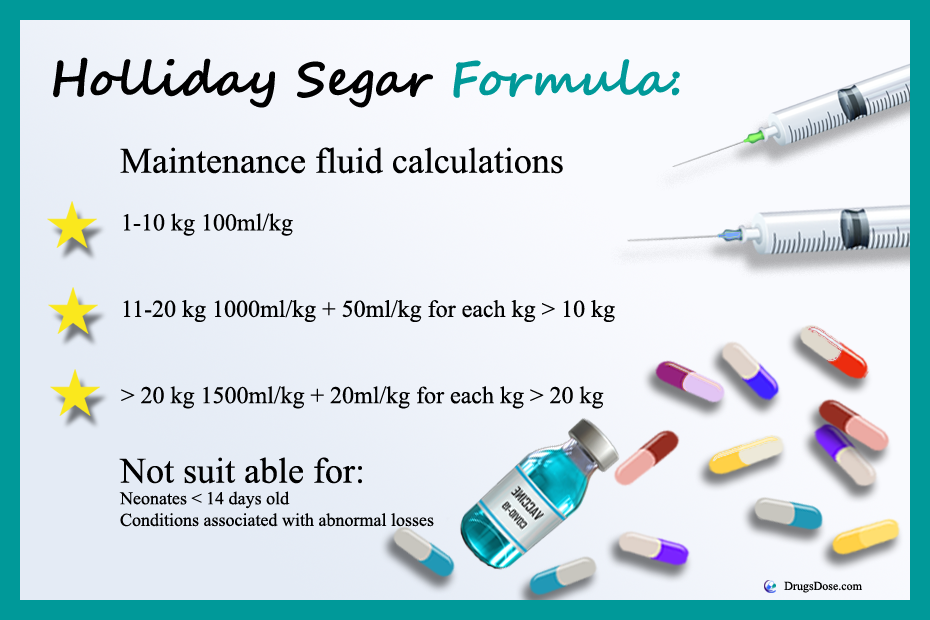Fluid Therapy
Fluid therapy is divided into MAINTENANCE, DEFICIT, and REPLACEMENT requirements. When choosing the type of fluid and volume to be administered, careful consideration should be paid to each component of fluid therapy. The Holliday-Segar equation remains the standard method for calculating maintenance fluid requirements. Accounting for deficits when determining the fluid infusion rate is an important factor in treating dehydrated patients; deficit fluid is generally administered over the first 24 hours of hospitalization.
MAINTENANCE REQUIREMENTS.
Maintenance fluid can be defined as the amount of fluid required to compensate for ongoing fluid losses, thus maintaining steady state in the body. It can be given by intravenous routes or oral routes (if patient can tolerate orally) or both. Water losses in the body are classified into SENSIBLE LOSS (urine and faecal water) and INSENSIBLE LOSS (perspiration and respiration).
Holliday Segar Method
Holliday segar method is a widely acceptable method of calculating maintenance fluid, especially in children. It helps to estimate the fluid requirement in 24 hours. The method is based on the weight of patient in kilogram. This formula relates water loss to the caloric expenditure. That is, for every 100 kilocalories burned, the patient utilizes 100ml.
The Holliday-Segar approximates daily fluid loss, and therefore the daily fluid requirements, as follows:
- 100 ml/kg for the 1st 10 kg of wt.
- 50 ml/kg for the 2nd 10 kg of wt.
- 20 ml/kg for the remaining wt.
Even though it is correct to think about fluid requirements on a 24-hour basis, the delivery pumps used in hospitals are designed to be programmed for an hourly infusion rate. The 24-hour number is often divided into approximate hourly rates for convenience, leading to the “4-2-1” formula.
- 100 ml/kg/24-hours = 4 ml/kg/hr for the 1st 10 kg
- 50 ml/kg/24-hours = 2 ml/kg/hr for the 2nd 10 kg
- 20 ml/kg/24-hours = 1 ml/kg/hr for the remainder
Example 1:
What will be the maintenance fluid requirement for a child weighing 6kg?
Wt= 6kg (this falls within first 10kg)
=100ml per kg
= 100ml*6 = 600ml
Therefore, the child requires 600ml of fluid in 24hrs (per day).
To express it in ml per hour, divide 600ml by 24hrs
= 25mls per hour
Using 4, 2, 1 formula (Holliday – Segar’s Formula) More accurate for ml per hour.
Wt= 6kg (this falls within first 10kg)
=4ml per kg
= 4ml*6 = 24ml per hour
Therefore, the child requires 24ml of fluid in per hrs.
Example 2:
A child weighing 14kg was rushed to the emergency department. Calculate the daily maintenance fluid of the child.
Wt = 14kg (10kg + 4kg)
First 10kg = 100ml per kg
= 100ml*10= 1000ml
Second 10kg (which is 4kg) = 50ml per kg
= 50ml*4 = 200ml
Daily maintenance fluid for the child of 14kg = 1000ml + 200ml = 1200ml.
To express it in ml per hour, divide 1200ml by 24
= 50mls per hour
Using 4, 2, 1 formula (Holliday – Segar’s Formula) More accurate for ml per hour.
Wt = 14kg (10kg + 4kg)
First 10kg = 4ml per kg
= 4ml*10= 40ml
Second 10kg (which is 4kg) = 2ml per kg
= 2ml*4 = 8ml
Maintenance fluid for the child of 14kg = 40ml + 8ml = 48ml per hour.
Example 3:
Calculate the maintenance fluid to be given to a patient weighing 22kg.
Wt = 10kg + 10kg + 2kg
First 10kg = 100ml per kg
= 100ml*10 = 1000ml
Second 10kg = 50ml per kg
= 50ml*10 = 500ml
Remaining kg (2kg) = 20ml per kg
= 20ml*2 = 40ml
Maintenance fluid = 1000ml + 500ml + 40ml
= 1540ml in 24hrs (per day).
To express it in ml per hour, divide 1540ml by 24
= 64.2ml per hour.
Using 4, 2, 1 formula (Holliday – Segar’s Formula) More accurate for ml per hour.
Wt = 10kg + 10kg + 2kg
First 10kg = 4ml per kg
= 4ml*10 = 40ml
Second 10kg = 2ml per kg
= 2ml*10 = 20ml
Remaining kg (2kg) = 1ml per kg
= 1ml*2 = 2ml
Maintenance fluid = 40ml + 20ml + 2ml
= 62ml per hour.

